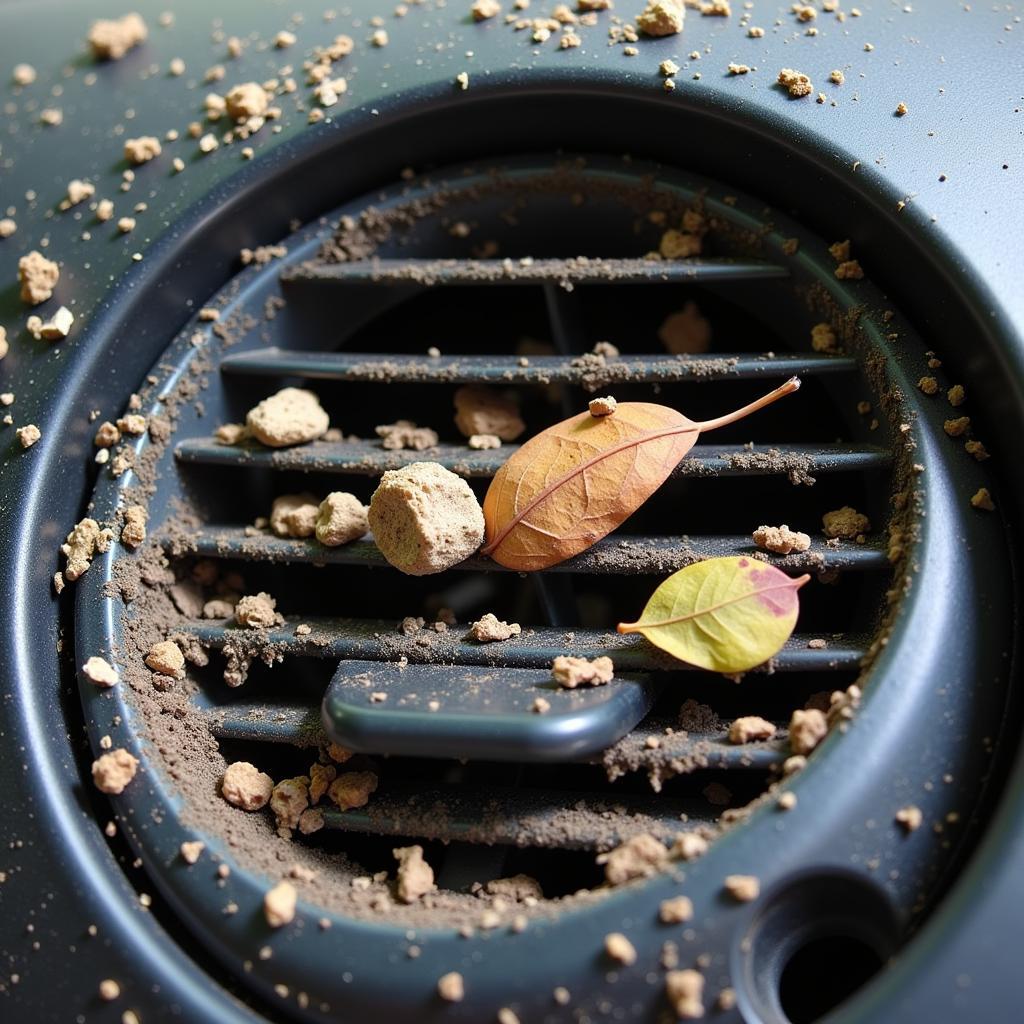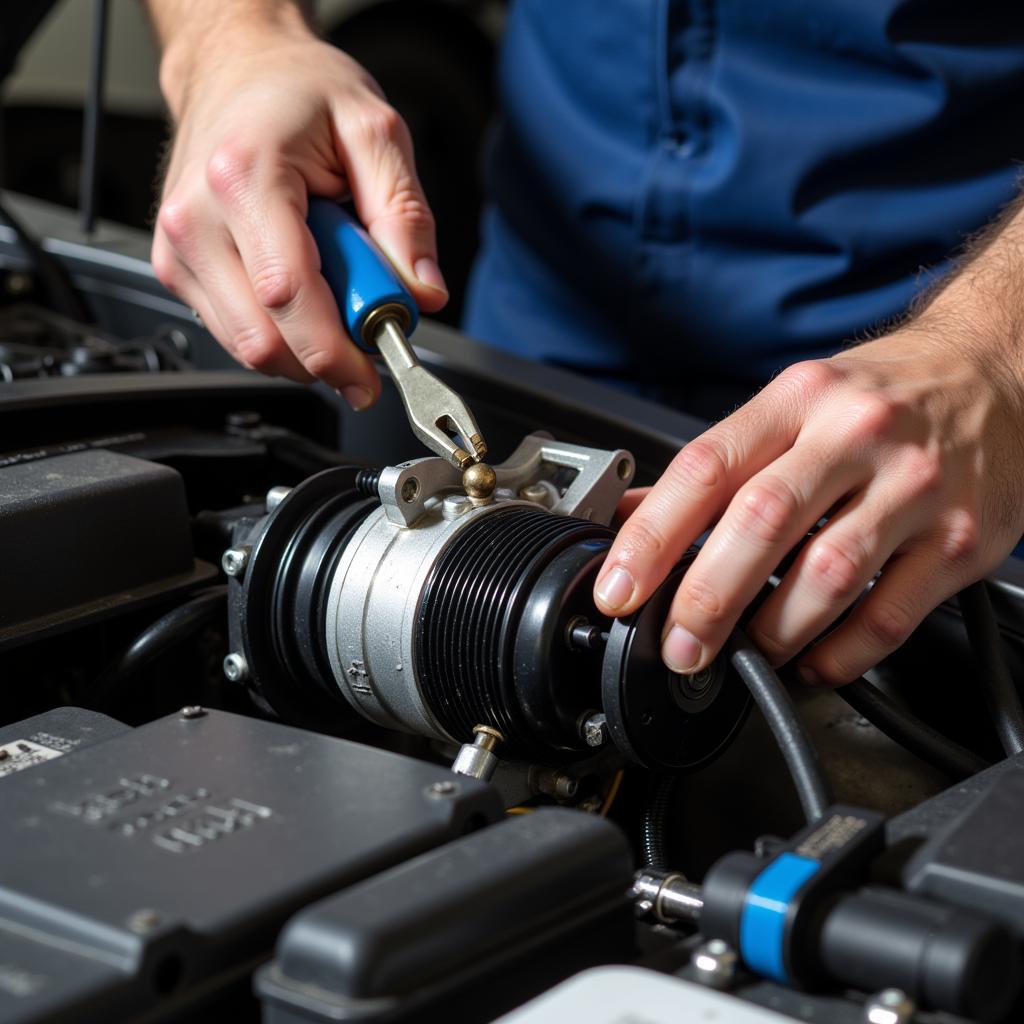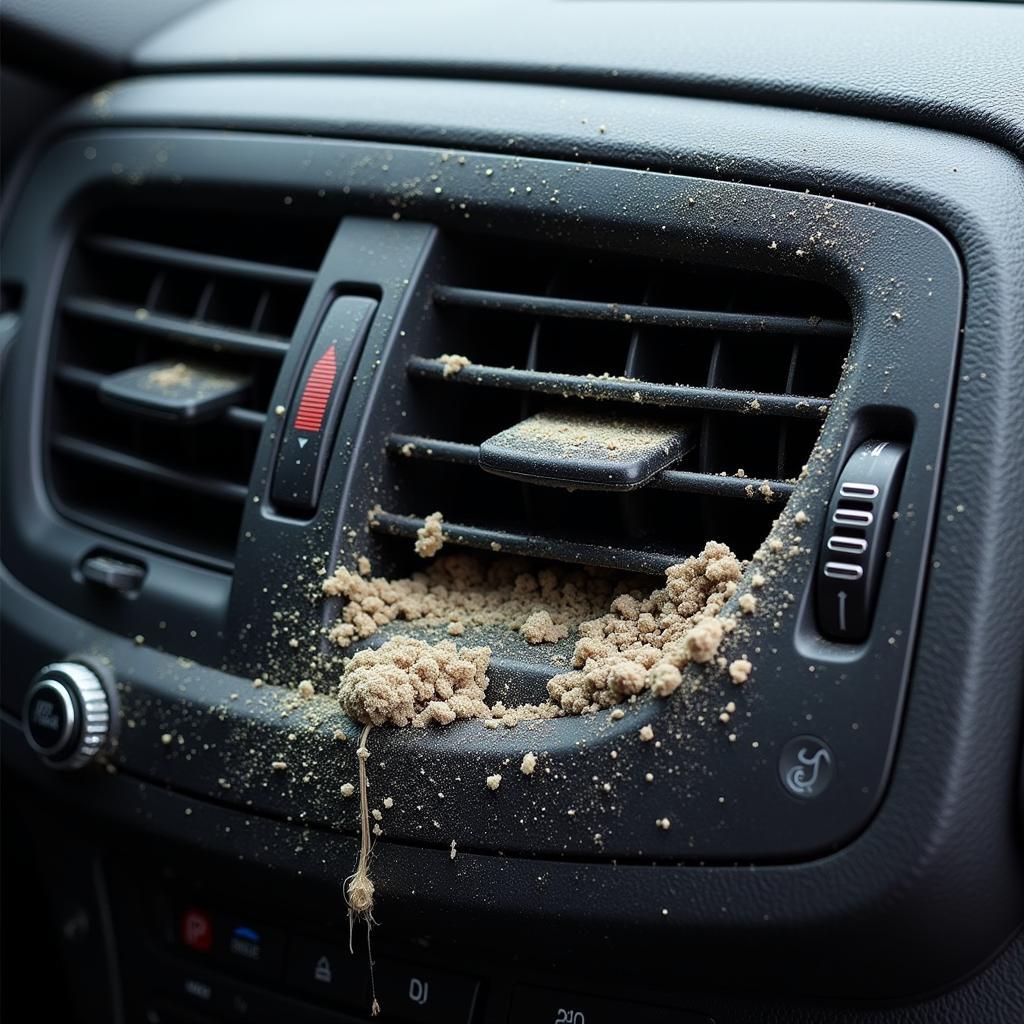Imagine this: It’s a scorching summer day, and you’re stuck in traffic. You turn on your car AC, but instead of a blast of cold air, you’re met with a lukewarm breeze or even worse – hot air! A malfunctioning car air conditioner can quickly turn a comfortable drive into a sweaty ordeal. But before you rush to the mechanic, there are several things you can try to diagnose and even fix the problem yourself. This comprehensive guide will walk you through the common causes of car AC issues and provide step-by-step instructions on how to troubleshoot and potentially fix them.
If you’re interested in learning about the costs associated with professional car AC repairs, you can find more information on ac fix cost car.
Understanding Your Car’s AC System
Before we dive into troubleshooting, it’s helpful to have a basic understanding of how your car’s AC system works. Here’s a simplified breakdown:
- Compressor: This is the heart of the system, responsible for compressing and circulating the refrigerant.
- Condenser: Located at the front of your vehicle, the condenser cools the refrigerant, transforming it from a gas to a high-pressure liquid.
- Receiver/Dryer: This component stores the refrigerant and removes any moisture.
- Expansion Valve: The valve regulates the flow of refrigerant into the evaporator.
- Evaporator: Positioned inside the dashboard, the evaporator absorbs heat from the cabin air as the refrigerant passes through it.
- Blower Motor: This motor blows the cooled air through the vents and into your car’s interior.
These components work together in a closed loop to cool the air inside your car. If any part of the system malfunctions, it can lead to a decrease in cooling efficiency or a complete AC failure.
Common Car AC Problems and Solutions
Now, let’s explore some common car AC issues and their possible solutions:
1. AC Blowing Warm Air
This is often the first sign of a problem. If your AC is blowing warm air, it could be due to several reasons:
-
Low Refrigerant: One of the most common culprits is a refrigerant leak. Over time, refrigerant can escape through tiny cracks or holes in the hoses, connections, or components.
- Solution: The first step is to check the refrigerant level. You can purchase a DIY recharge kit, but it’s best to have a professional mechanic check for leaks and recharge the system properly.
-
Faulty Compressor: The compressor is responsible for pressurizing and circulating the refrigerant. If it fails, the AC won’t be able to cool the air.
- Solution: Diagnosing a faulty compressor requires specialized tools. If you suspect a compressor issue, it’s best to consult a qualified mechanic.
-
Clogged Condenser: The condenser can become clogged with debris like leaves, dirt, and insects, restricting airflow and reducing cooling efficiency.
- Solution: Inspect the condenser for any blockages. You can carefully clean it using a garden hose or compressed air.
 Clogged Car AC Condenser
Clogged Car AC Condenser
2. Weak Airflow
Weak airflow from your AC vents can be frustrating, especially on hot days. Here are a few possible reasons:
-
Clogged Cabin Air Filter: Just like your engine air filter, the cabin air filter can get clogged with dirt and debris, restricting airflow.
- Solution: Replacing the cabin air filter is a relatively simple DIY task. Consult your owner’s manual for its location and replacement instructions.
-
Faulty Blower Motor: The blower motor is responsible for pushing the cooled air through the vents. If it’s failing, you’ll notice weak or no airflow.
- Solution: A mechanic can diagnose and replace a faulty blower motor.
-
Electrical Issues: Problems with the AC control module, wiring, or fuses can also lead to weak airflow.
- Solution: It’s best to leave electrical troubleshooting to a qualified mechanic.
3. AC Making Strange Noises
Unusual noises coming from your AC system are often a sign of a mechanical issue that requires attention.
-
Hissing or Squealing: These noises can indicate a refrigerant leak or a problem with the compressor.
- Solution: Have the system inspected for leaks by a mechanic as soon as possible.
-
Clicking or Rattling: These sounds could mean a loose belt, a worn-out bearing in the compressor, or a problem with the blower motor.
- Solution: Ignoring these noises can lead to further damage. Consult a mechanic to diagnose and address the root cause.
 Car AC Compressor and Tools
Car AC Compressor and Tools
4. AC Not Turning On At All
If your AC doesn’t turn on at all, here are a few things to check:
-
Fuses: A blown fuse in the AC circuit could be the culprit.
- Solution: Check your owner’s manual for the location of the AC fuse and replace it if necessary.
-
Electrical Connections: Loose or corroded electrical connections can prevent the AC system from receiving power.
- Solution: Inspect the wiring and connections for any signs of damage or corrosion.
-
Faulty AC Control Module: The AC control module sends signals to various components of the AC system. If it malfunctions, the AC may not turn on at all.
- Solution: Diagnosing and replacing the AC control module is best left to a professional.
5. AC Smells Bad
A foul odor coming from your AC vents is not only unpleasant but can also indicate underlying issues:
-
Mold or Mildew Growth: Moisture buildup in the evaporator case can create a breeding ground for mold and mildew, leading to a musty smell.
- Solution: Cleaning the evaporator case and air ducts can help eliminate the odor. There are also commercially available AC disinfectant sprays.
-
Burning Smell: A burning smell could be a sign of an electrical issue, such as a short circuit or an overheating component.
- Solution: If you notice a burning smell, turn off your AC immediately and consult a mechanic to prevent potential damage.
 Car AC Vent with Dust
Car AC Vent with Dust
Maintaining Your Car AC System
Prevention is always better than cure. Regular maintenance can help prevent costly AC repairs and prolong the life of your car’s AC system. Here are some essential maintenance tips:
- Regular Inspections: Inspect your AC system at least once a year, preferably before the start of summer. Look for any signs of leaks, damage, or wear and tear.
- Refrigerant Recharge: If your AC isn’t cooling as effectively as it used to, it might be low on refrigerant. Have it recharged by a qualified technician.
- Cabin Air Filter Replacement: Replace your cabin air filter every 12,000 miles or as recommended in your owner’s manual.
- Condenser Cleaning: Clean your AC condenser regularly, especially during spring and fall, to remove debris that can restrict airflow.
- Run Your AC Regularly: Even during winter, run your AC for a few minutes every month to keep the compressor lubricated and the system functioning properly.
When to Seek Professional Help
While some car AC problems can be addressed with DIY solutions, it’s crucial to recognize when professional help is necessary. If you’re facing a complex issue, such as a faulty compressor or electrical problems, it’s best to leave it to the experts. Attempting complex repairs without the proper knowledge and tools can lead to further damage and higher repair costs.
Conclusion
A malfunctioning car air conditioner can make driving uncomfortable and even unbearable, especially during extreme weather conditions. By understanding the common causes of AC problems and following the troubleshooting steps outlined in this guide, you can potentially diagnose and fix some issues yourself. However, it’s important to remember that professional help is often necessary for more complex problems. Regular maintenance and timely repairs are crucial for keeping your car’s AC system in optimal condition and ensuring a comfortable driving experience year-round.
Need help with your car’s air conditioning system? Contact AutoTipPro today at +1 (641) 206-8880 or visit our office at 500 N St Mary’s St, San Antonio, TX 78205, United States. Our team of expert technicians is here to assist you with all your car AC needs.






Leave a Reply